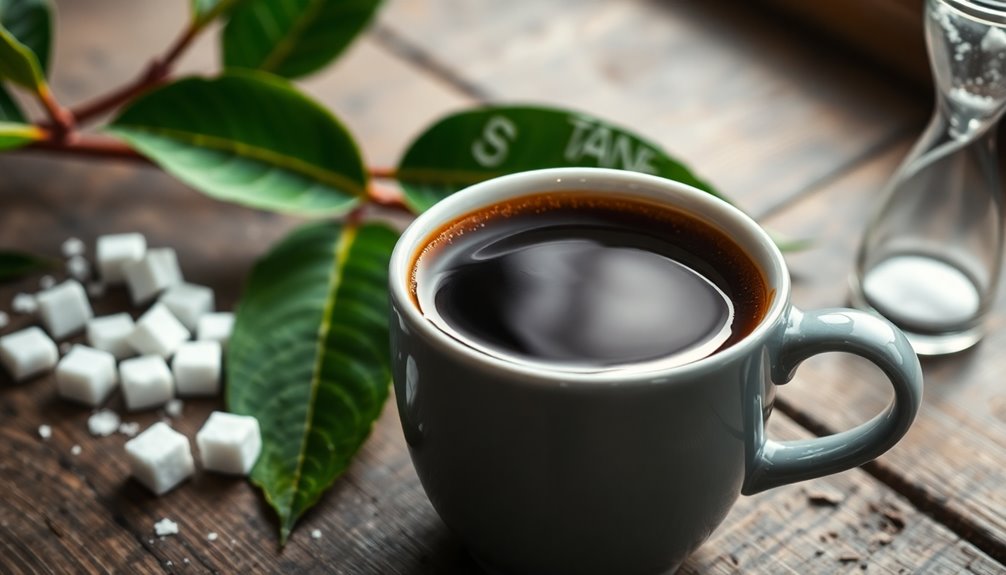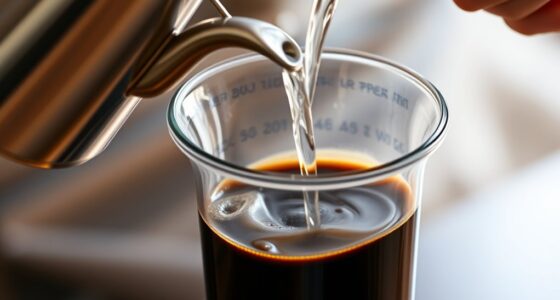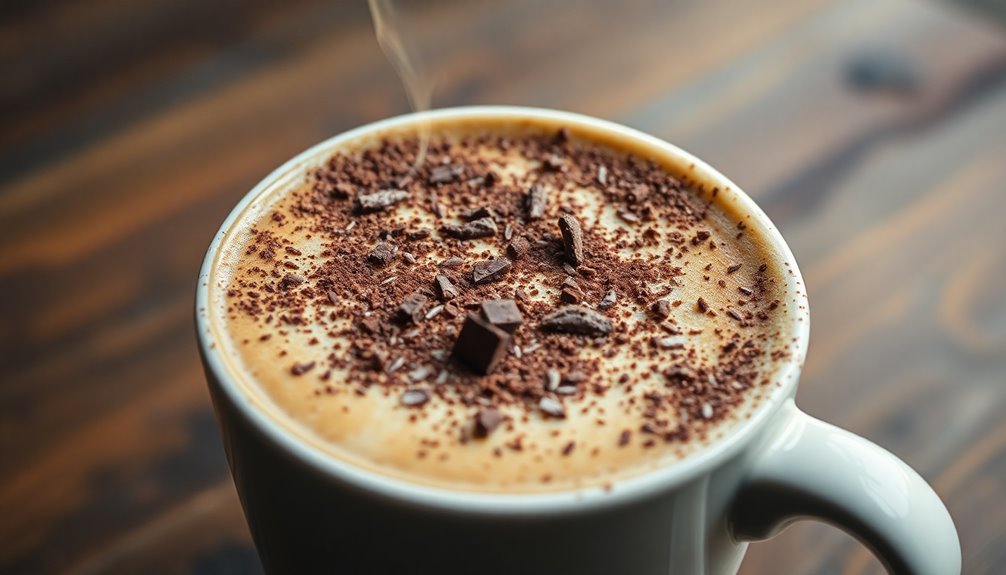Espresso can be both a delightful pick-me-up and a potential pitfall. On the plus side, its high antioxidant content improves your mood, boosts endurance, and enhances cognitive function. A shot can sharpen your focus and elevate your performance, making it great for workouts. However, the high caffeine levels may lead to increased heart rate, anxiety, and even sleep disturbances, especially if you're sensitive to caffeine. Moderation is key to enjoying its benefits while avoiding drawbacks. Curious about how different factors influence your experience with espresso? You might find some surprising insights ahead.
Key Takeaways
- Espresso is rich in antioxidants, providing health benefits and combatting oxidative stress more effectively than many teas.
- Moderate consumption enhances cognitive function, improving alertness, focus, and memory recall.
- It boosts physical performance, reducing perceived exertion and enhancing endurance during workouts.
- High caffeine content can lead to increased heart rate, anxiety, and sleep disruption in sensitive individuals.
- Pregnant women and those with certain health concerns should monitor their espresso intake closely.
Health Benefits of Espresso

While many people enjoy espresso for its rich flavor and energy boost, it also offers a range of health benefits that can enhance your overall well-being. Some of the potential health benefits of espresso include improved mental focus and alertness, an increased metabolism, and potential protection against certain diseases. Additionally, espresso contains a high level of antioxidants, which can help boost the immune system and protect the body from free radicals. For those who are unfamiliar, what is a doppio espresso? A doppio espresso is a double shot of espresso, which provides even more of a caffeine kick and potential health benefits.
Espresso is packed with antioxidants like polyphenols and hydrocinnamic acids, which help neutralize free radicals and reduce oxidative stress. In fact, it has a higher antioxidant capacity than both green and black teas.
You'll also enjoy improved concentration and memory, thanks to caffeine's ability to stimulate dopamine.
If you're looking to boost your physical performance, espresso can enhance endurance and even reduce muscle soreness after intense workouts.
Plus, it's low in calories—only about 3 per ounce—making it a guilt-free way to elevate your mood and energy levels. Additionally, regular consumption of espresso may support overall cellular health, similar to the benefits of beet juice due to its high antioxidant content.
Potential Risks and Side Effects

Although many people relish the invigorating effects of espresso, it's important to be aware of its potential risks and side effects.
The high caffeine content can spike your heart rate and even alter your heartbeat rhythm, leading to conditions like atrial fibrillation. If you're sensitive to caffeine, you might also find it disrupts your sleep and increases anxiety levels.
A laxative effect may cause digestive issues, especially if consumed excessively. Moreover, caffeine acts as a mild diuretic, raising your chances of dehydration.
Pregnant women and those with certain health concerns should be particularly cautious, as even moderate consumption can pose risks. Always consider how your body reacts and adjust your intake accordingly. Additionally, individuals with conditions like gout symptoms should monitor their caffeine intake due to potential interactions with medications.
Impact on Cognitive Function

Understanding the potential risks of espresso doesn't paint the full picture; its effects on cognitive function are noteworthy as well. Consuming espresso boosts alertness, vigilance, and accuracy, making tasks feel less daunting.
Just a 100-mg dose of caffeine can elevate your mood and sharpen your focus within 30 minutes. You'll notice improved reaction times and better performance on attention-related tasks, like driving or studying.
Moreover, moderate espresso intake enhances both short-term and long-term memory, aiding in information recall, especially when preparing for exams. The caffeine also speeds up decision-making processes.
Plus, with its neuroprotective properties, espresso may even play a role in preventing cognitive decline linked to diseases like Alzheimer's. So, a little espresso could go a long way for your brain!
Effects on Physical Performance

When you sip on a cup of espresso before a workout, you're not just indulging in a rich flavor; you're also unlocking potential benefits for your physical performance.
Caffeine enhances endurance, improving your time-trial results in activities like running and cycling. It reduces muscle pain and perceived exertion, allowing you to push through longer workouts. In fact, a meta-analysis shows that caffeine can lead to a performance improvement of up to 15.9% in time trials(15.9%).
For high-intensity efforts, espresso boosts your sprinting speed and increases your ability to perform explosive movements, making it ideal for team sports.
Caffeine stimulates adrenaline production, improving blood flow to your muscles and enhancing strength.
With effects lasting several hours, you can enjoy a significant performance edge during competitions, whether you're a seasoned athlete or just getting started.
Considerations for Consumption

Before you pour yourself another shot of espresso, it's essential to consider your individual tolerance and overall health.
Experts recommend limiting caffeine intake to 400 mg per day, roughly 6-7 shots of espresso. Remember, factors like age, health, and caffeine sensitivity play a significant role in how your body reacts. If you weigh around 175 pounds, stick to that 400 mg guideline.
Also, don't forget to account for other caffeine sources in your diet, like sodas. While moderate consumption can boost cognitive function and provide antioxidants, excessive intake can disrupt sleep and cause anxiety.
Pay attention to how your body feels after each shot, and adjust your consumption accordingly to enjoy the benefits without the drawbacks.
Frequently Asked Questions
How Does Espresso Compare to Regular Coffee in Taste?
Espresso packs a punch in flavor compared to regular coffee.
You'll notice its intense, rich taste, often with notes of chocolate and caramel. The brewing method creates a concentrated drink, giving you a thicker texture and a velvety crema.
While regular coffee is smoother and milder, espresso's balanced bitterness and acidity create a complex profile that can be both bold and nuanced, making it a unique option for coffee lovers like you.
Can Espresso Be Consumed on an Empty Stomach?
Yes, you can consume espresso on an empty stomach, but it's important to know your body's tolerance.
The quick absorption of caffeine can give you a strong boost, but it might also lead to jitters or anxiety for some.
If you experience discomfort, try adding milk or having it with food.
What Are Popular Espresso-Based Drinks?
When you're exploring popular espresso-based drinks, you've got plenty of delicious options.
You might enjoy a creamy latte or a bold macchiato for a richer experience. If you're looking for something unique, try a cortado, which balances espresso and milk perfectly.
For a sweet treat, a mocha or affogato could satisfy your cravings. Don't forget the classic Americano if you prefer a milder flavor.
Each drink offers a different way to savor espresso!
How Much Espresso Is Considered a Serving?
A standard serving of espresso is typically a single shot, which measures about 1 fluid ounce or 30 ml. This shot uses 7 to 9 grams of ground coffee, brewed in roughly 30 seconds.
If you're looking for more caffeine, a double shot, or doppio, is around 2 fluid ounces and requires 14 to 18 grams of coffee.
Depending on your preference, you can also explore variations like ristretto or lungo for different flavors and strengths.
Is Decaffeinated Espresso an Option?
Yes, decaffeinated espresso is definitely an option for you!
It allows you to enjoy the rich flavor of espresso without the jitters that come from caffeine.
You'll find that a shot of decaf typically contains about 10 milligrams of caffeine, so it's gentle on your system.
Plus, it retains many antioxidants and can be enjoyed any time of day, making it a great choice for those sensitive to caffeine.
Conclusion
In conclusion, espresso offers a mix of health benefits and potential risks that you should weigh carefully. Its ability to boost cognitive function and enhance physical performance can be appealing, but don't overlook the side effects that come with excess consumption. If you enjoy your daily cup, just remember to keep moderation in mind. Ultimately, whether or not espresso is worth the buzz depends on your personal health and lifestyle choices. Enjoy it wisely!










